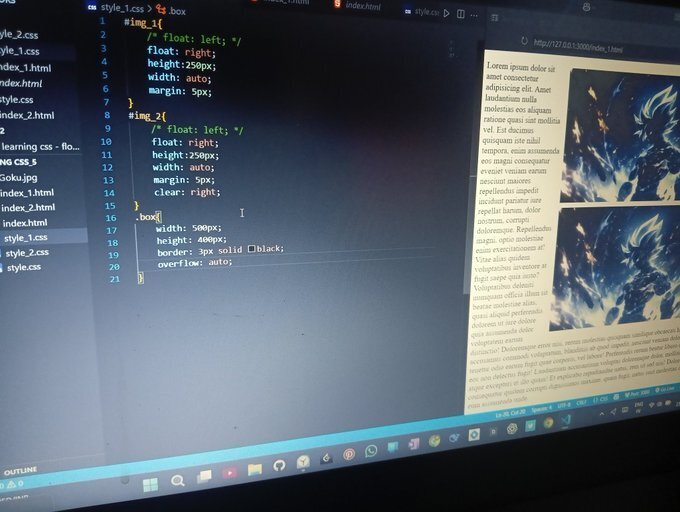Refactoring with Result<T, E> and Custom Errors
Refactoring with Result and Custom Errors: Turning Panic-Prone Code into Recoverable Operations Error handling is one of the less glamorous but absolutely essential aspects of software development. In Rust, where safety and robustness are paramount, mastering error handling is a rite of passage. If you've been sprinkling .unwrap() and .expect() in your code like it's sugar on cereal, it's time to take your skills to the next level. In this post, we'll explore how to refactor panic-prone Rust code into clean, recoverable operations using Result and custom error types. Whether you're building a CLI tool, a backend service, or a game engine, proper error handling is key to creating reliable and maintainable software. By the end of this article, you'll know how to replace those pesky .unwrap() calls with idiomatic Rust patterns, write custom error types that make debugging a breeze, and avoid common pitfalls that even seasoned developers encounter. Why Panic When You Can Recover? In Rust, the Result type is your best friend when it comes to handling errors gracefully. It represents either a successful result (Ok(T)) or an error (Err(E)), allowing you to explicitly deal with failure. Compare this to methods like .unwrap() or .expect(), which immediately terminate your program if something goes wrong. Imagine you're writing a file parser: use std::fs; use std::io; fn read_file(path: &str) -> String { let contents = fs::read_to_string(path).unwrap(); contents } This works fine—until it doesn’t. If the file doesn’t exist or you lack permissions, .unwrap() will panic, taking your entire application down with it. That might be okay for a quick script, but in production, panics are your enemy. Instead, we can use Result to make the failure recoverable: use std::fs; use std::io; fn read_file(path: &str) -> Result { let contents = fs::read_to_string(path)?; Ok(contents) } Much better! By returning a Result, we let the caller decide how to handle the error. The ? operator is the star of this refactor—it propagates errors up the call stack cleanly and concisely. Writing Custom Error Types Sometimes, the built-in error types like io::Error aren’t descriptive enough for your needs. Maybe you have multiple error sources, or you want to provide richer context. That’s where custom error types come in. Here’s an example of creating a custom error for a fictional CSV parser: use std::fmt; #[derive(Debug)] enum CsvError { FileNotFound(String), InvalidFormat(String), } impl fmt::Display for CsvError { fn fmt(&self, f: &mut fmt::Formatter) -> fmt::Result { match self { ConfigError::FileNotFound(file) => write!(f, "Configuration file not found: {}", file), ConfigError::IoError(e) => write!(f, "I/O error: {}", e), } } } impl std::error::Error for ConfigError {} fn read_config() -> Result { fs::read_to_string("config.toml").map_err(|e| match e.kind() { std::io::ErrorKind::NotFound => ConfigError::FileNotFound("config.toml".to_string()), _ => ConfigError::IoError(e), }) } The error messages are much clearer now, and the caller can distinguish between different failure modes. Step 3: Add Context at Each Level Finally, let’s enrich the errors even further by adding context when propagating them: use std::fs; use std::fmt; #[derive(Debug)] enum ConfigError { FileNotFound(String), IoError(std::io::Error), } impl fmt::Display for ConfigError { fn fmt(&self, f: &mut fmt::Formatter

Refactoring with Result and Custom Errors: Turning Panic-Prone Code into Recoverable Operations
Error handling is one of the less glamorous but absolutely essential aspects of software development. In Rust, where safety and robustness are paramount, mastering error handling is a rite of passage. If you've been sprinkling .unwrap() and .expect() in your code like it's sugar on cereal, it's time to take your skills to the next level. In this post, we'll explore how to refactor panic-prone Rust code into clean, recoverable operations using Result and custom error types.
Whether you're building a CLI tool, a backend service, or a game engine, proper error handling is key to creating reliable and maintainable software. By the end of this article, you'll know how to replace those pesky .unwrap() calls with idiomatic Rust patterns, write custom error types that make debugging a breeze, and avoid common pitfalls that even seasoned developers encounter.
Why Panic When You Can Recover?
In Rust, the Result type is your best friend when it comes to handling errors gracefully. It represents either a successful result (Ok(T)) or an error (Err(E)), allowing you to explicitly deal with failure. Compare this to methods like .unwrap() or .expect(), which immediately terminate your program if something goes wrong.
Imagine you're writing a file parser:
use std::fs;
use std::io;
fn read_file(path: &str) -> String {
let contents = fs::read_to_string(path).unwrap();
contents
}
This works fine—until it doesn’t. If the file doesn’t exist or you lack permissions, .unwrap() will panic, taking your entire application down with it. That might be okay for a quick script, but in production, panics are your enemy. Instead, we can use Result to make the failure recoverable:
use std::fs;
use std::io;
fn read_file(path: &str) -> Result<String, io::Error> {
let contents = fs::read_to_string(path)?;
Ok(contents)
}
Much better! By returning a Result, we let the caller decide how to handle the error. The ? operator is the star of this refactor—it propagates errors up the call stack cleanly and concisely.
Writing Custom Error Types
Sometimes, the built-in error types like io::Error aren’t descriptive enough for your needs. Maybe you have multiple error sources, or you want to provide richer context. That’s where custom error types come in.
Here’s an example of creating a custom error for a fictional CSV parser:
use std::fmt;
#[derive(Debug)]
enum CsvError {
FileNotFound(String),
InvalidFormat(String),
}
impl fmt::Display for CsvError {
fn fmt(&self, f: &mut fmt::Formatter<'_>) -> fmt::Result {
match self {
CsvError::FileNotFound(file) => write!(f, "File not found: {}", file),
CsvError::InvalidFormat(details) => write!(f, "Invalid CSV format: {}", details),
}
}
}
impl std::error::Error for CsvError {}
With this custom error type, you can now provide meaningful error messages:
use std::fs;
fn read_csv(path: &str) -> Result<String, CsvError> {
let contents = fs::read_to_string(path).map_err(|_| CsvError::FileNotFound(path.to_string()))?;
if !contents.contains(",") {
return Err(CsvError::InvalidFormat("Missing commas".to_string()));
}
Ok(contents)
}
Now, instead of cryptic error messages, your users get helpful hints about what went wrong. Better yet, you’ve structured your errors in a way that makes debugging much easier.
A Real-World Refactor: From Panic to Graceful Error Handling
Let’s refactor a small program step-by-step. Suppose you’re building a command-line tool that reads a configuration file:
Panic-Prone Code
use std::fs;
fn main() {
let config = fs::read_to_string("config.toml").unwrap();
println!("Configuration loaded: {}", config);
}
This works until the config file is missing or corrupted. A single missing file could crash the entire application.
Step 1: Use Result
We start by replacing .unwrap() with proper error propagation:
use std::fs;
use std::io;
fn read_config() -> Result<String, io::Error> {
let config = fs::read_to_string("config.toml")?;
Ok(config)
}
fn main() {
match read_config() {
Ok(config) => println!("Configuration loaded: {}", config),
Err(e) => eprintln!("Error loading configuration: {}", e),
}
}
Now the program handles errors gracefully, but the error message isn’t very user-friendly.
Step 2: Introduce a Custom Error Type
Let’s add more context with a custom error:
use std::fs;
use std::fmt;
#[derive(Debug)]
enum ConfigError {
FileNotFound(String),
IoError(std::io::Error),
}
impl fmt::Display for ConfigError {
fn fmt(&self, f: &mut fmt::Formatter<'_>) -> fmt::Result {
match self {
ConfigError::FileNotFound(file) => write!(f, "Configuration file not found: {}", file),
ConfigError::IoError(e) => write!(f, "I/O error: {}", e),
}
}
}
impl std::error::Error for ConfigError {}
fn read_config() -> Result<String, ConfigError> {
fs::read_to_string("config.toml").map_err(|e| match e.kind() {
std::io::ErrorKind::NotFound => ConfigError::FileNotFound("config.toml".to_string()),
_ => ConfigError::IoError(e),
})
}
The error messages are much clearer now, and the caller can distinguish between different failure modes.
Step 3: Add Context at Each Level
Finally, let’s enrich the errors even further by adding context when propagating them:
use std::fs;
use std::fmt;
#[derive(Debug)]
enum ConfigError {
FileNotFound(String),
IoError(std::io::Error),
}
impl fmt::Display for ConfigError {
fn fmt(&self, f: &mut fmt::Formatter<'_>) -> fmt::Result {
match self {
ConfigError::FileNotFound(file) => write!(f, "Configuration file not found: {}", file),
ConfigError::IoError(e) => write!(f, "I/O error: {}", e),
}
}
}
impl std::error::Error for ConfigError {}
fn read_config() -> Result<String, ConfigError> {
fs::read_to_string("config.toml").map_err(|e| match e.kind() {
std::io::ErrorKind::NotFound => ConfigError::FileNotFound("config.toml".to_string()),
_ => ConfigError::IoError(e),
})
}
fn main() {
match read_config() {
Ok(config) => println!("Configuration loaded: {}", config),
Err(e) => eprintln!("Error: {}", e),
}
}
Common Pitfalls and How to Avoid Them
Overusing
.unwrap()or.expect()
Don’t use these methods unless you’re absolutely certain that failure is impossible (e.g., hardcoded test data). They’re convenient but dangerous in production code.Ignoring Context
Default errors can be vague. Always add context to your errors to make debugging easier.Overengineering Error Types
While custom errors are powerful, avoid creating a labyrinth of enums if simpler solutions (likethiserrororanyhow) suffice.Forgetting to Implement
std::error::Error
Custom error types should almost always implement thestd::error::Errortrait for compatibility with other libraries.
Key Takeaways
-
Resultis central to idiomatic Rust error handling. Use it to propagate errors cleanly with the?operator. -
Custom error types improve clarity and maintainability. Use enums to represent different failure modes and implement
Displayfor user-friendly messages. -
Avoid panics in production code.
.unwrap()and.expect()are fine for quick scripts but should be avoided in serious applications. -
Leverage libraries like
thiserrororanyhowto simplify error handling if your project’s complexity grows.
Next Steps
Ready to dive deeper? Here are some excellent resources to continue your Rust error-handling journey:
- The Rust Book: Error Handling
- Error Handling in Rust: A Guide
- Libraries like
thiserrororanyhow
Happy coding, and may your Rust code be panic-free!




























































_.png)












































































































![[The AI Show Episode 151]: Anthropic CEO: AI Will Destroy 50% of Entry-Level Jobs, Veo 3’s Scary Lifelike Videos, Meta Aims to Fully Automate Ads & Perplexity’s Burning Cash](https://www.marketingaiinstitute.com/hubfs/ep%20151%20cover.png)




























































































































![[DEALS] FileJump 2TB Cloud Storage: Lifetime Subscription (85% off) & Other Deals Up To 98% Off – Offers End Soon!](https://www.javacodegeeks.com/wp-content/uploads/2012/12/jcg-logo.jpg)



![From electrical engineering student to CTO with Hitesh Choudhary [Podcast #175]](https://cdn.hashnode.com/res/hashnode/image/upload/v1749158756824/3996a2ad-53e5-4a8f-ab97-2c77a6f66ba3.png?#)










































































































































_sleepyfellow_Alamy.jpg?width=1280&auto=webp&quality=80&disable=upscale#)

















































































































![watchOS 26 May Bring Third-Party Widgets to Control Center [Report]](https://www.iclarified.com/images/news/97520/97520/97520-640.jpg)

![AirPods Pro 2 On Sale for $169 — Save $80! [Deal]](https://www.iclarified.com/images/news/97526/97526/97526-640.jpg)
![Apple Shares Official Trailer for 'The Wild Ones' [Video]](https://www.iclarified.com/images/news/97515/97515/97515-640.jpg)




































































